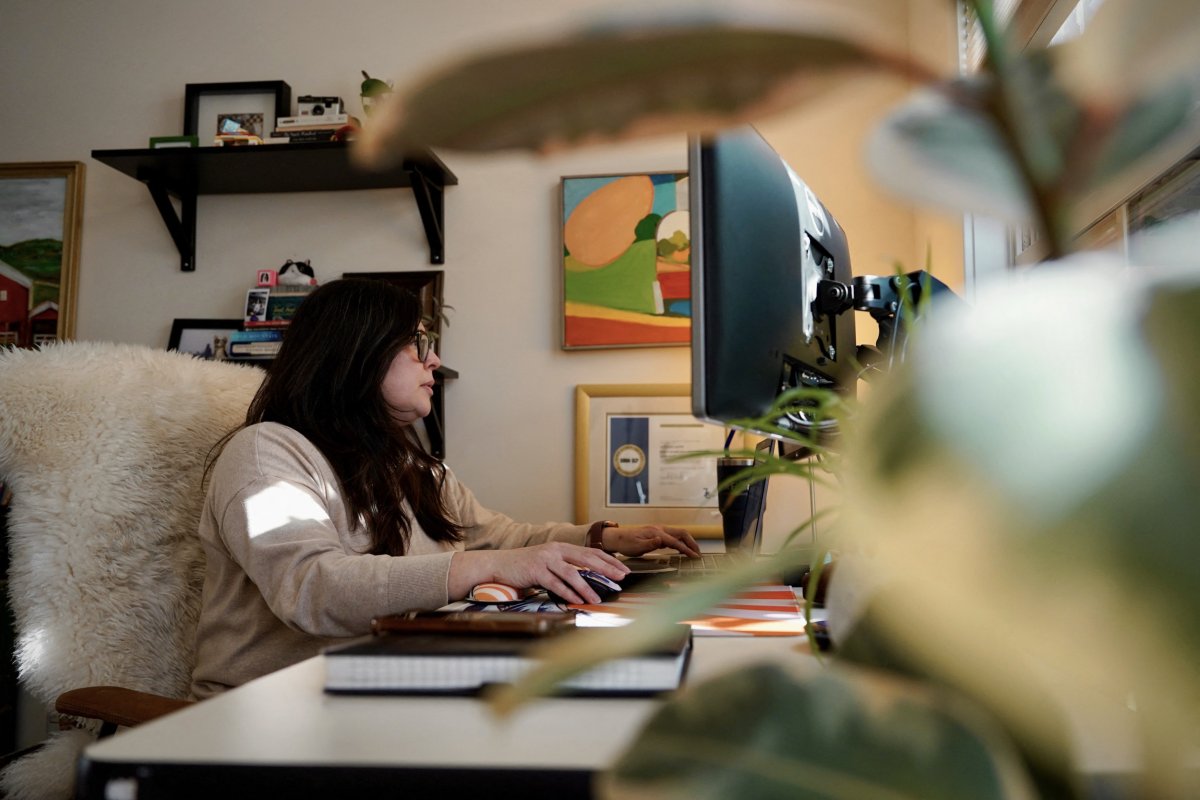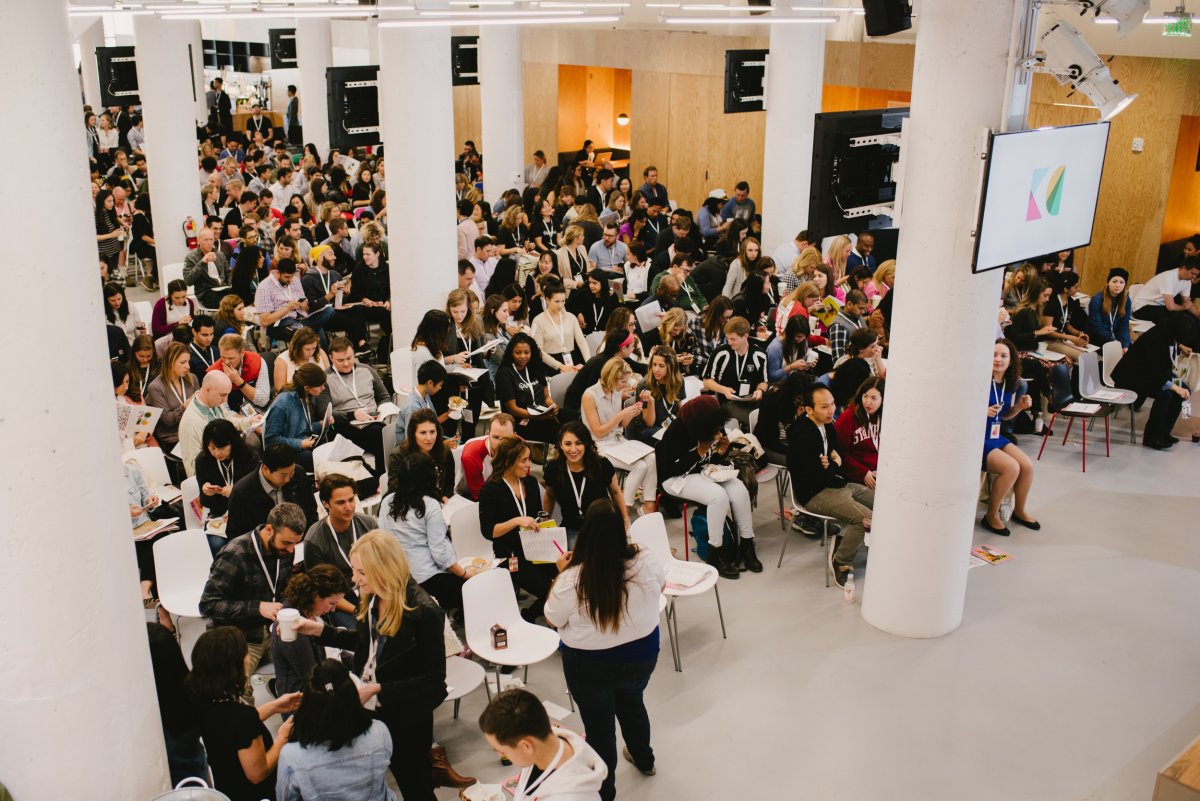Every once in a while, panic rips through the workforce at Pinterest.
"I don't think there's anything that we've done internally to give people the impression," Doniel Sutton, the chief people officer at Pinterest, told Newsweek. "But when people see articles mandating five days a week back in [the] office, it automatically triggers a thought in people's mind, 'Well, could that possibly occur here?"
Five years ago, the pandemic forced millions of workers across corporate America to work from home. As "commuting" vanished from office vernacular and Zoom meetings became the norm, business leaders hailed flexible work options as the future of work.
Now, employers are reversing their position. Amazon, AT&T, Boeing, Dell, Goldman Sachs, JPMorgan, Tesla and The Washington Post have all issued five-day return-to-office (RTO) mandates. Major tech players, including Apple, Google, IBM, Meta and Salesforce, are also requiring employees to work in-person in some weekly capacity.
But as thousands of employees are being told that their days of working remotely are over, some tech companies, like Pinterest, are doubling down on flexibility in the workplace. Their workforces couldn't be happier.
This year, Pinterest received the highest possible score on Newsweek's ranking of America's Greatest Workplaces in Tech 2025, achieving five stars this year.
Airbnb and Dropbox, which also offer remote work policies, appeared on the list as well. The ranking, which was published in partnership with Plant-A Insight Group, ranked companies based on data gathered from over 400,000 employee interviews and 4.9 million company reviews.
"The most consistent response we get is, 'Please don't take it away!'" Sutton laughed.

"We conduct employee voice surveys twice a year and since its inception, PinFlex has been the highest-rated survey item every year," Sutton said. "People love it. It allows them to more effectively integrate both their work and their personal life. It's particularly beneficial for working parents, caregivers, people who have unpredictable life situations."
A study published in Personnel Psychology last year showed that remote workers are more satisfied with their jobs, more committed to their organization and less likely to want to leave it. Personnel Psychology is a research journal centered around people at work.
At the same time, RTO policies have reportedly taken a toll on employees. An internal memo from JPMorgan that was leaked on Tuesday showed morale down among employees. The bank's leadership attributed dissatisfaction with the company culture to its March decision, which required all employees to work full-time in the office. Previously, employees were expected to be in-person three days a week.
Speaking on the growing number of RTO mandates across the country, Sutton said, "We obviously see those situations and feel pretty confident that we've made the right decision for Pinterest."
In fact, PinFlex—Pinterest's remote work model—is often cited as the main driver for candidates, according to Sutton.
"People are looking for flexibility. They are looking for an environment where they can do their best work, but also focus on life," the chief people officer said.
Before PinFlex was implemented three years ago, two-thirds of Pinterest's workforce was based in the Bay Area. Now, employees in that region only make up about a third of the workforce. Sutton herself is based out of Orange County.
Airbnb, which also allows employees to work remotely with its "Live and Work Anywhere" policy, describes a similar advantage of recruiting more qualified candidates, especially those located in non-tech hubs like Boston and Chicago.
"Live and Work Anywhere is certainly great because not all the best quality people in the world are within 50 miles of San Francisco," Dave Stephenson, Airbnb's chief business officer and head of employee experience, told Newsweek.
"We're able to tap into [a new pool of] people who are experienced and have amazing skills from Kansas City to Miami to New York to Hong Kong to everywhere in between. We're all over the world and that enables us to pick the best people at any given job," he said.

Brad Alge, an associate professor in organizational behavior and human resources at Purdue University, told Newsweek that remote work options are a great way for firms to expand their talent pool. Offering these policies can enable organizations to tap into a global talent pool without requiring relocation and to target populations of workers who may struggle in a traditional office setting.
"One of our [Employee Resource Groups] is focused on neurodivergency, and so we understand people have different struggles that they're dealing with," Sutton said. "We want to allow them some agency, to choose what will be most valuable for them, and to make sure that the support system is there."
Flexible workplaces can also be a non-negotiable for some employees.
"Younger generations (Gen Z, Millenials) expect to have location flexibility," Alge said. "Companies that don't offer flexible work will be at a competitive disadvantage in terms of hiring talent. "
While Millenials make up 70 percent of Pinterest's workforce, it's not lost on Sutton that Gen Z is the company's next fastest growing population.
"We're very intentional on bringing them together for learning opportunities," she said. "Even though we have a remote first work policy, we put a lot of attention and resources to bringing teams together in our offices around the world for collaboration, community building and engagement."
The biggest concern when it comes to remote work is that these models can lead to feelings of isolation for workers. Pinterest and Airbnb both seek to combat that by offering in-person worksites for their staff. Pinterest has 24 offices around the globe, while Airbnb has 26 offices worldwide.

The data and research team at Plant-A told Newsweek that support for remote work and flexible work arrangements is particularly high among Pinterest employees, 89 percent, compared to the software and information services industry average of 75 percent.
Those insights also showed Airbnb with clear year-over-year improvements, with 80 percent of employees saying there is a high level of trust, transparency and respect among workers at all levels, compared to last year's 71 percent. Airbnb's 80 percent was also higher than the industry average of 73 percent.
This year, Airbnb received four and a half stars on America's Greatest Workplaces 2025. Receiving the same four-and-a-half score was Dropbox, the file hosting service that describes itself as a "Virtual First" company.
Speaking at Atlassian's Team '25 conference in April, Allison Vendt, Dropbox's vice president of people operations and experience, called Virtual First "the working model of the future."
"It really combines the best of both remote and in-person work and we really focus on how we work versus where we work," Vendt said.
Data from Plant-A shows that employees at Dropbox ranked the company higher than the industry average, with 82 percent stating that their employer supports work-life balance opportunities at home, compared to the industry average of 73 percent.
"When we were designing Virtual First, we wanted to make sure it was also in-line with our values," she said. "I think something that was true then, and continues to be true, is that there's really no substitute for being in-person and that human connection."
By being more intentional with the in-person time that Dropbox employees spend together, Vendt said the company has been able to ensure that 99 percent of work gatherings deliver at least one positive business outcome.
"Eighty-six percent of employees rate that their team effectiveness improves after they gather," she added.
Remote options haven't only improved the time employees spend face-to-face with each other, but also the face-to-face time they now spend with their communities.
At Pinterest, where employees have up to 40 calendar hours of volunteer time off, Sutton has seen an increase in volunteer work.
"We also notice that there's an uptick [in volunteering] when disasters like the LA fires happen," Sutton said. "Even the executive team and I did some volunteer work ourselves. We really try to promote not just the positivity we create for folks who use our platform, but for the broader society that we live in and are supported by."
.png)



